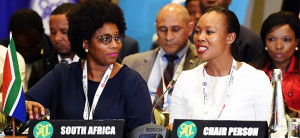
Most people in the Southern African Development Community (SADC) region are still being denied access to information.
This was the word from communications minister Ayanda Dlodlo yesterday during the SADC ICT Ministers' Meeting, in Durban.
Delegates are discussing a range of technical issues, including the region's ICT priorities, SADC ICT policy, ICT infrastructure development, as well as migration to digital broadcasting.
The meeting is being held under the theme "Preparing SADC for the Fourth Industrial Revolution through ICTs".
According to Dlodlo, of SADC's population of 300 million people, only 16.3% are using the Internet, compared to penetration of 47% globally.
"We must establish communications systems that are accessible, affordable, efficient and reliable, that move at a pace faster than the evolution of technology and are of high quality. These systems must be fully integrated to meet the diverse requirements and ensure connectivity for the citizens of the SADC region," Dlodlo said.
Slow progress
She added the ICT infrastructure must allow more people to access the huge variety of information, services and technologies offered by business, government and local communities.
Dlodlo noted that despite the slow progress, there have been some inroads in the sector. These include 'Internet for all' initiatives, which aim to connect all unconnected SADC citizens; broadcast digital migration, which is helping to free up additional bandwidth; the Smart Africa Initiative, which uses technology to address development challenges; the African Internet Exchange System, which aims to build strong Internet connectivity in Africa; and ITU Connect 2020 to allow for affordable and universal broadband access in the SADC region.
The challenge, the minister noted, was the high cost of data, especially in SA, which she said drives up the cost of communication and restricts access, particularly for young people who use mobile applications to stay in touch, access services and information.
"Data is the new currency. It opens the doors to communication, education and employment opportunities," she said.
As such, the minister said, government is probing the high cost of mobile data through the competition authorities.
The Competition Commission is the latest public body to look into the cost to communicate in SA. The commission probe follows on the heels of the Independent Communications Authority of SA (ICASA), which in July launched its own inquiry to determine the priority markets in the electronic communications sector. The regulator said this was part of its plans to address the high cost of communication in SA, including the cost of data.
The debate over the high cost to communicate in SA has been raging for some time and gained traction in September 2016 when South Africans took to social media to complain about high mobile data costs under the banner #DataMustFall.
Dlodlo said initial interventions will ensure provisions that data bundles do not automatically expire after 30 days but have a cascading scale.
"We must work to ensure there [is] no digital divide in skills between disadvantaged and advantaged children and youth. Let us boost our efforts around drawing all our people into the benefits of technology," she said.
Roaming costs
The high cost of roaming within the SADC region also came under the spotlight, with renewed calls for operators to reduce roaming costs in Southern Africa or do away with them altogether.
Loopholes in regulations have led to some operators taking advantage of consumers by charging them exorbitant amounts for roaming, with some South Africans paying as much as R5 more per minute when roaming in countries like Swaziland and Botswana, according to an ICASA official.
However, if the ministers have their way, these costs could soon be slashed by up to 30%. The high cost of cross-border calls is seen as a hindrance in economic development and the movement of people within SADC, something which is also a threat to the goal of regional integration.
"We are making progress, but it's not going to be easy. As you know, if you travel from country to country, what they charge you for making a call is an excessive amount of money and you normally get bill shock for roaming. We want to change that," said ICASA councillor Peter Zimri.
The SADC "roam like at home" initiative wants to convince operators to allow consumers to pay charges as close as they would have paid in their home countries. The initiative was signed in 2007 by SADC ministers of communication but is yet to be fully operationalised.
"For us as South Africa, achieving low roaming charging for calls is important not only for attracting visitors to our country but it's also important for cross-border trade. What we have established in this project is that there are areas where costs have dropped by up to 60% on certain routes.
"As a result of the drop in certain routes, what we have also noticed is that there has been an increase in traffic in those routes because it has become cheap to communicate so that is the essence of this 'roam like at home' initiative and we want to spread it to all SADC countries," Zimri said.
Share